On Dec. 4, the NHL’s board of governors voted unanimously to approve an expansion bid by the city of Seattle to give the league 32 franchises. The team is slated to begin play during the 2021-22 season, meaning an expansion draft in the summer of 2021. According to Gary Bettman, the expansion draft will have the same rules as the Vegas Expansion Draft in 2017.
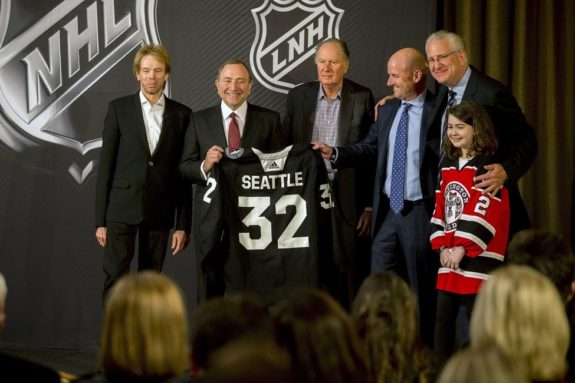
If you need a refresher as to what those rules were, each of the existing franchises (excluding the Vegas Golden Knights) can protect up to 11 players. These can be broken down into seven forwards, three defensemen, and a goaltender or eight skaters and one goalie. Players with no movement clauses must be protected unless they waive said clause.
Related: What Does Expansion Mean for the St. Louis Blues
Only players who have accumulated more than two professional seasons at the end of 2020-21 are eligible to be drafted. Players with less experience are ineligible to be drafted and don’t need to be protected. Finally, teams must expose two forwards and one defenseman who are under contract for the 2021-22 season and meet games played thresholds as well as one goalie under contract for that season.
So, what does the Seattle franchise mean to the Nashville Predators? How will the expansion draft affect the team and will GM David Poile do anything to avoid losing a valuable asset? Let’s get to the bottom of all three questions.
The Predators and the Vegas Expansion Draft
When the Golden Knights entered the league, they acquired the majority of their roster through the expansion draft held in June 2017. For that expansion draft, the Predators were one of the teams most at-risk to lose a valuable player. They chose to protect eight skaters rather than seven forwards and three defensemen. This was so they could keep their top-four defensemen together.

As a result, they protected Viktor Arvidsson, Filip Forsberg, Calle Järnkrok, Ryan Johansen, Mattias Ekholm, Ryan Ellis, Roman Josi, and P.K. Subban, as well as netminder Pekka Rinne. This meant that their exposed players included Pontus Åberg, James Neal, Miikka Salomäki, Colton Sissons, Craig Smith, Austin Watson, Colin Wilson, Anthony Bitetto, Matt Irwin, and Yannick Weber.
The team lucked out that they didn’t have to protect Kevin Fiala and Juuse Saros as neither had enough professional experience, making the team’s protection list decisions easier. The Golden Knights went with Neal as he was the most accomplished player on the exposure list, even if he was only signed for one year. Losing him was difficult as he was a member of the team that went to the 2017 Stanley Cup Final, but his absence did free up cap space, which allowed the team to sign Nick Bonino and acquire Kyle Turris.
What Will the Roster Look Like in 2021
Although there are two seasons before Seattle begins play, the Predators have eight players currently signed to deals that extend through the 2021-22 season. That doesn’t take into account restricted free agents (RFAs) whose contracts expire between now and the expansion draft and will be under team control. That is a lot of players to make decisions on and, once again, the Predators are likely to be a team in danger of losing an important player.
Goaltenders
I’m starting with the goaltender position because it is the one position where the team is safe. While neither Rinne nor Saros have contracts after 2020-21, Saros is all but guaranteed to be extended before the final year of his current deal, which carries a $1.5 million cap hit. He will be a 26-year-old RFA at that point and is likely to receive a long-term commitment from the team and it will be an easy decision to protect him.
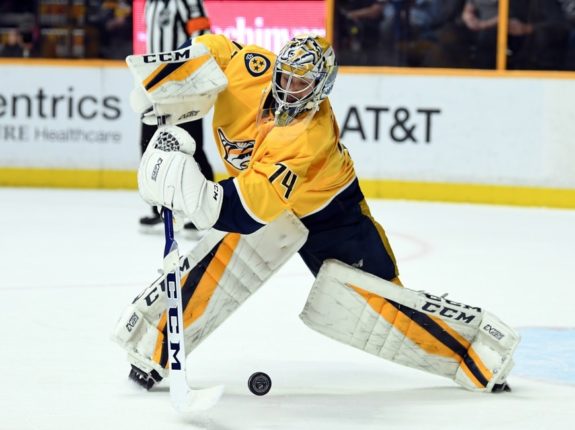
Rinne, meanwhile, signed a two-year extension in November that starts next season and expires at the same time as Saros’ current contract. As a pending free agent at the time of the expansion draft, it is unlikely the Predators protect him and even more unlikely that Seattle selects the 38-year-old netminder. After the expansion draft, the team could still re-sign him to ensure he’ll be a lifelong Predator if he’s productive, but there’s always a chance he’ll retire before Seattle enters the league.
Defensemen
This is where things get interesting. Ekholm, Ellis, and Subban are all signed through 2021-22 and all three are part of the team’s vaunted top-four. Ekholm and Subban’s deals expire after the 2021-22 season when Ekholm is 32 and Subban is 33. Ellis is signed through 2026-27 after he signed an eight-year, $50 million extension in August that averages $6.25 million per season.
There’s also Josi, whose current contract expires after the 2019-20 season but there is a strong chance he is extended before then. Given his current $4 million cap hit, which he has outperformed, he is due a sizable raise on his next deal.
They also have some quality defense prospects in the farm system, most notably Dante Fabbro, currently a junior with great potential at Boston University. There are several things that could happen with him. One option is that he remains at B.U. and plays his senior year of college hockey before turning pro.
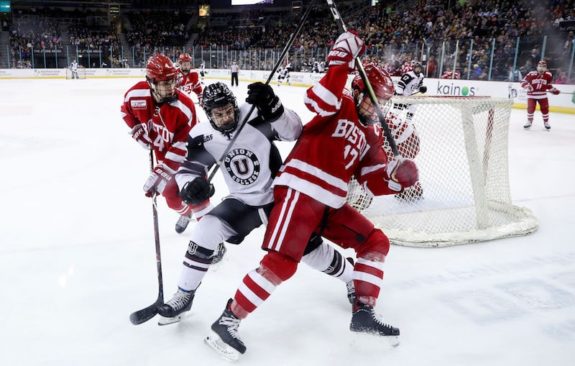
The other option is that he leaves college after this season, turns pro, and likely plays all of next season in the AHL or is a third-pair blueliner in the NHL. From a team perspective, the first option is most desirable. If he plays a fourth year of college hockey, he won’t have accrued enough professional experience to be exposed in the expansion draft and therefore won’t need to be protected.
Forwards
If looking at the team’s defensemen is interesting, looking at their forwards is downright terrifying. Arvidsson, Forsberg, Järnkrok, Johansen, and Turris all have contracts signed through 2021-22. Forsberg and Järnkrok’s expire after the 2021-22 season, Arvidsson and Turris’ run through 2023-24, and Johansen’s doesn’t end until after 2024-25.
Ryan Hartman, Eeli Tolvanen, Fiala, and Sissons all have contracts that expire between now and the expansion draft. However, all will be RFAs when their current deals expire and the Predators are likely to retain them. Fiala, Hartman, and Tolvanen seem like candidates to receive long-term deals similar to the team-friendly contracts Arvidsson, Ellis, and Forsberg signed when their entry-level contracts expired.
There are also several forwards who will be unrestricted free agents before the Seattle Expansion Draft occurs, including Frédérick Gaudreau, Austin Watson, Bonino, Salomäki, and Smith. Of those players, only Smith is considered part of the team’s core. His current contract, which carries a $4.25 million cap hit, expires after next season when he will be 30 and looking for what is likely the last long-term contract of his career. It is up in the air whether or not the Predators will extend him and, if they do, how long that extension will be for.
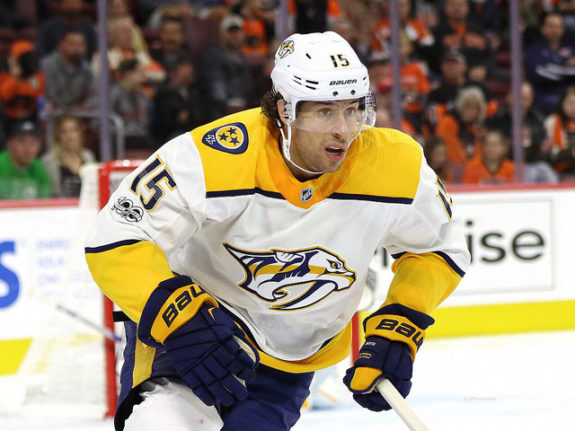
Protection/Exposure Options
The only players I think are locks to be protected are Arvidsson, Ellis, Forsberg, Johansen, Saros, and Tolvanen. That’s because all are either part of the team’s current or future core and have contract certainty or team control. The rest of the players will either be north of 30 when the expansion draft arrives or have contracts that expire before or soon after Seattle joins the league. Here a few scenarios I could see playing out for the Predators in the expansion draft.
Best Case Scenario
Protect: Arvidsson, Ekholm, Ellis, Forsberg, Johansen, Josi, Saros, Subban, and Tolvanen
In this scenario, the Predators protect eight skaters and a goaltender. They let Fiala, Hartman, Järnkrok, Sissons, Turris, and others be exposed. They part with an asset to not lose Fiala, Hartman, or Turris, but let Järnkrok and others remain available. Finally, for this scenario to work, Fabbro stays in college for another year.
With this scenario, they keep their core intact and don’t lose any of their top-four while protecting their top forward line and Tolvanen. They would risk losing Fiala, Hartman, Järnkrok, or Turris, but it likely wouldn’t cost too much to ensure Seattle takes Järnkrok given what Vegas accepted to not take players in 2017.
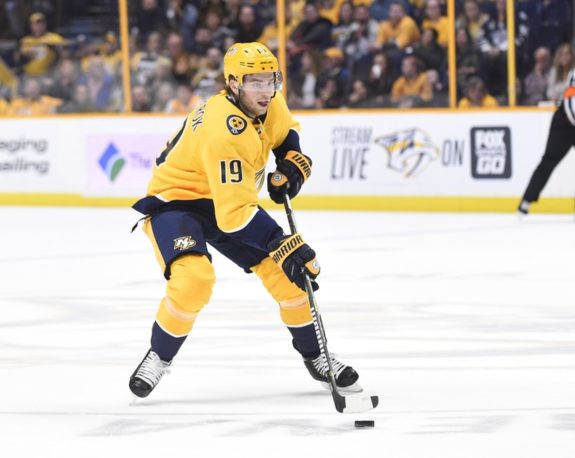
Worst Case Scenario
Protect: Arvidsson, Ekholm, Ellis, Fabbro, Forsberg, Johansen, Josi, Saros, and Tolvanen
This scenario is created because Fabbro doesn’t stay at B.U. and turns pro, forcing the Predators to protect him. That leaves them protecting four defensemen and they have to go with the eight skaters protection list again. If that’s not bad enough, Poile can’t reach a deal with Seattle to protect key exposed players, leaving the Predators susceptible to losing someone important. And if you’ve paid attention to absences from the protection list, that means Fiala, Hartman, Järnkrok, Subban, and Turris are available, severely hindering the team.
What I’d Like to See Happen
Protect: Arvidsson, Ekholm, Ellis, Fiala, Forsberg, Hartman, Johansen, Saros, Subban, Tolvanen, and Turris
This is a scenario in which the Predators protect seven forwards and three defensemen. They protect their key forwards and three of their defensemen. This comes on the heels of trading either Ekholm or Josi, both of which I think have merit. Fabbro stays in college and they still have to expose Järnkrok, but it provides the team with a strong roster moving forward.
What Can Poile Do?
Simple math shows that the Predators will be one of the most troubled teams in the Seattle Expansion Draft just as they were when Vegas joined the league. They have more quality and productive players than they can protect and most of them are currently signed or will be signed through the 2021-22 season.
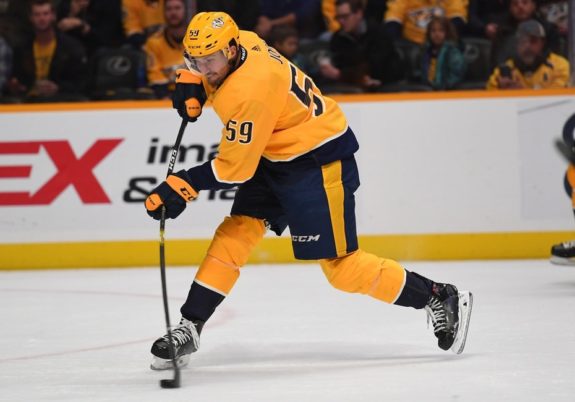
Luckily, though, they don’t have any overly bad contracts. You could quibble with the cap hits of Johansen and Turris at $8 and $6 million, respectively. You could also have a problem with the length of Ellis’ extension as he’s never played a full season in his career due to injuries.
Yet the Predators won’t have to contend with any no movement clauses when the expansion draft arrives. Rinne currently has one and his extension has one as well, but that deal expires after the 2020-21 season. The lack of bad contracts is great, especially when expansion drafts occur.
As a result, the Predators will be able to protect whoever they want, yet that still isn’t good enough. Will Poile pull some strings to protect roster players like the Columbus Blue Jackets and Winnipeg Jets did in the Vegas Expansion Draft? Will he trade a proven NHL player beforehand for younger players who don’t need to be protected? Or will he simply protect what he deems to be the core and let Seattle pick who they want? You can only lose one player, so there’s merit to that option.
Personally, I think the Predators should protect themselves as much as possible and not be at-risk for losing someone important for nothing. That means dealing an NHL player for assets, either picks or prospects, and ensuring that their core stays together. But only time will tell what happens. What do you think the Predators should do with their roster to prepare it for the Seattle Expansion Draft. Let me know in the comments below.